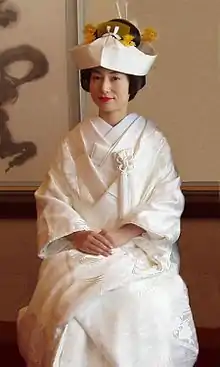白無垢
Japanese

Japanese formal wedding kimono, a shiromuku, still used today.
| Kanji in this term | ||
|---|---|---|
| 白 | 無 | 垢 |
| しろ Grade: 1 |
む Grade: 4 |
く Hyōgaiji |
| yutōyomi | ||
Noun
白無垢 (hiragana しろむく, rōmaji shiromuku)
- A huge, thick, heavy, formal, ornate, brocaded, traditional pure-white-on-white kimono overcoat, worn by the bride for a traditional Japanese Shinto and Buddhist wedding ceremony; a Japanese Shinto and Buddhist wedding dress. Comparable to a uchikake and is sometimes described as just a white uchikake; a shiromuku kimono is worn for the formal, solemn traditional Shinto ceremony, symbolizing the purity and maidenhood of the bride coming into the marriage. The bride may change into a red kimono for the events after the ceremony for good luck. A shiromuku will also come with matching accessories, such as kanzashi (hairsticks), a sensu (handfan), etc. Due to the expense of making a shiromuku, few own, or are likely to buy, a brand-new shiromuku kimono (those who do already own one are likely to have inherited it from close family elders); it is not unusual to rent kimono, shiromuku in particular, for special occasions; and indeed Shinto shrines are known to keep and rent-out such shiromuku kimono heirlooms for traditional weddings.
Coordinate terms
See also



This article is issued from Wiktionary. The text is licensed under Creative Commons - Attribution - Sharealike. Additional terms may apply for the media files.